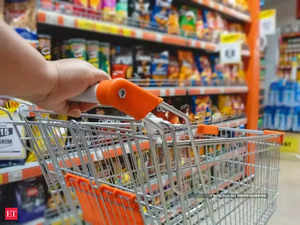Synopsis
Experts in the industry predict that retail prices of kitchen staples, such as sugar, flour, edible oil, and dairy products, will remain stable during the festival season due to strict government measures. Food inflation has started to cool off after the government implemented export restrictions, stock holding limits, and increased supplies. Consumption of these items typically increases during the festival season, but experts believe there will be no spike in prices.
 Agencies
AgenciesNEW DELHI: Retail prices of kitchen staples such as sugar, flour, edible oil and dairy products are expected to stay under control during the peak festival season because of the strict measures taken by the government in recent months, said experts from across the industry.
Food inflation, though remains high, has started to cool off from recent highs, after the government took a series of measures such as imposing export restrictions and stock holding limits, as well as offloading wheat, rice, chana and onions in the local market to augur supplies and tame prices.
Consumption of wheat flour, gram flour, dairy items, cooking oil and sugar usually peaks during the festival season, which starts with Onam and continues till Christmas, peaking during Diwali.
“No spike in the prices of sugar is expected on account of shortages,” Shree Renuka Sugars executive director Ravi Gupta said, adding that the sweetener from the new sugar season will reach the market before Diwali, he said.
India’s sugar season starts on October 1. The festival of Diwali is in November this year.
He, however, said sugar prices had been too low for too long, and they needed to gradually move up in line with increase in the fair and remunerative price and global prices.
“After a sharp increase last year, prices of milk have stabilised. We also don’t expect to see any spike in the coming quarters despite the increase in consumption of dairy products such as ghee, on account of festivals,” said Akshali Shah, executive director, Parag Milk Foods.
In September, food secretary Sanjeev Chopra had said the government was not expecting a sharp increase in prices of any food item during the festival season.
As a measure to combat hoarding and keep prices under control, the Ministry of Consumer Affairs, Food and Public Distribution extended stock limit on popular pulses such as tur and urad till December 31 from October 30. It has also made stock disclosure compulsory for sugar mills and traders.
In addition to export restrictions on wheat and rice, the food ministry has also revised the stock holding limit on wheat.
Year-on-year increase in vegetable prices, which had soared 37.4% in July led by tomatoes, eased in August to 26.1%. Inflation in cereals moderated from around 13% in July to 11.85% in August. September inflation numbers are expected on Thursday.
Meanwhile, the cost of a meal fell 17% for vegetarian and 9% for non-vegetarian from the prior month in September, bringing some respite to the common man, according to a report by ratings firm Crisil.
Read More News on
(Catch all the Business News, Breaking News Events and Latest News Updates on The Economic Times.)
Download The Economic Times News App to get Daily Market Updates & Live Business News.
…moreless

